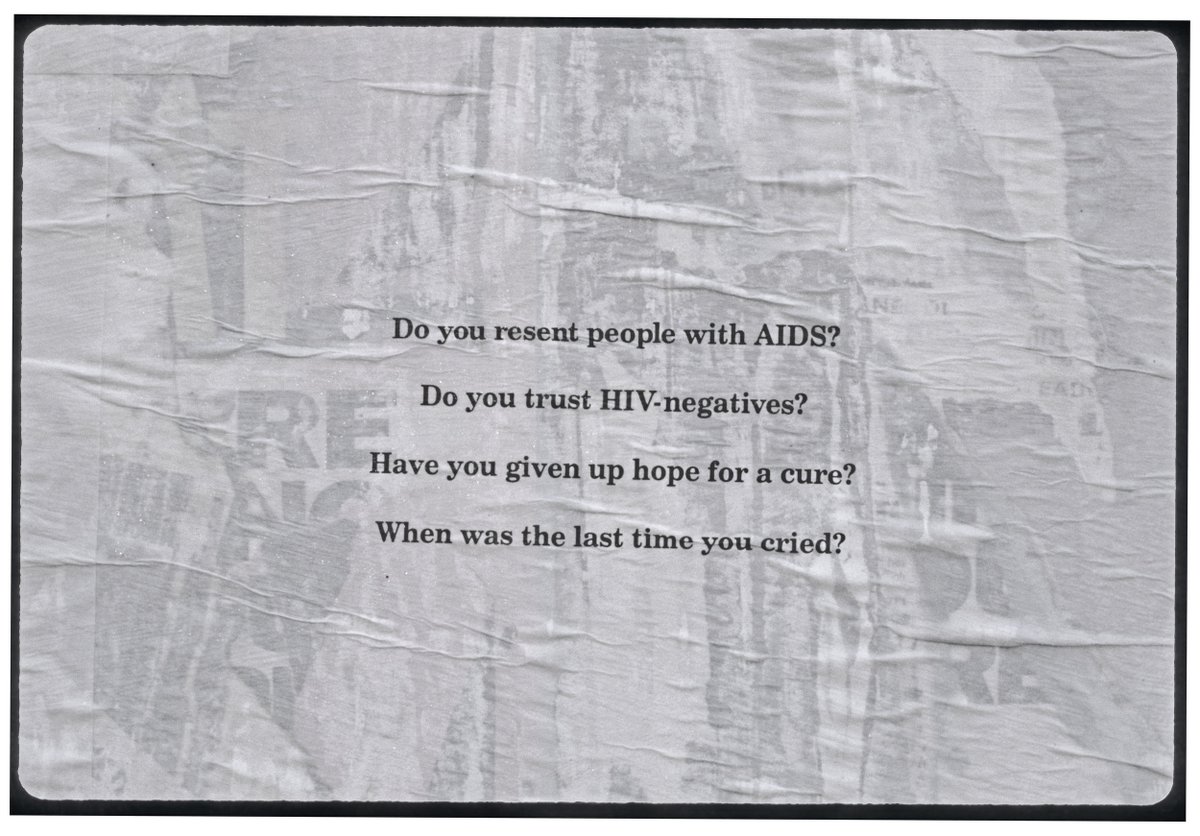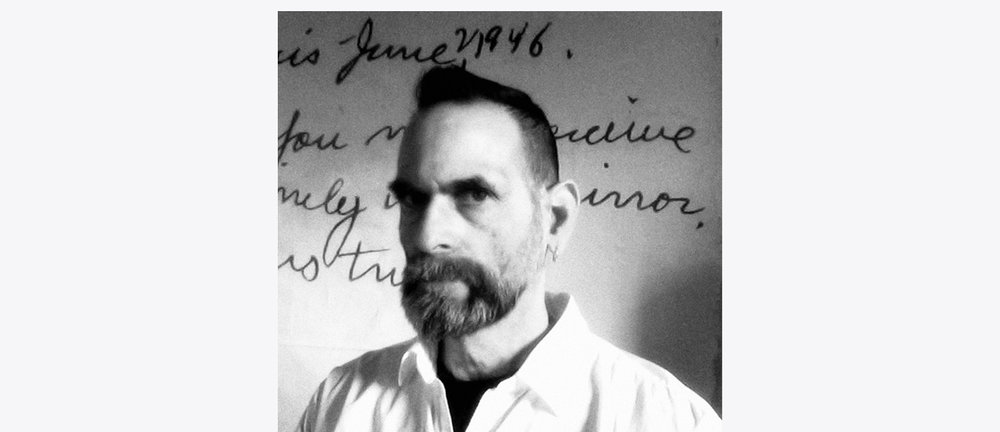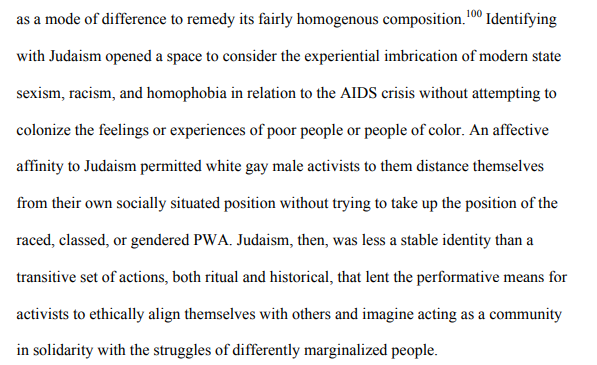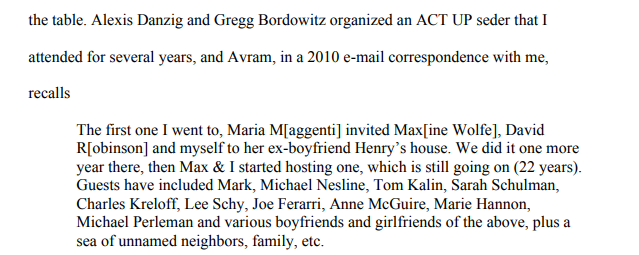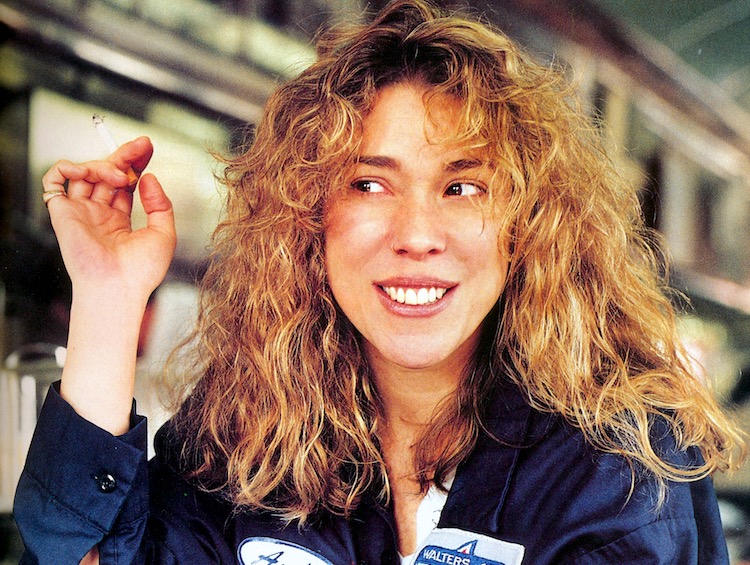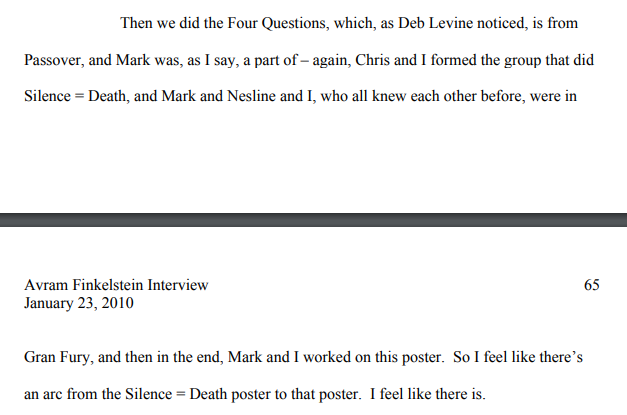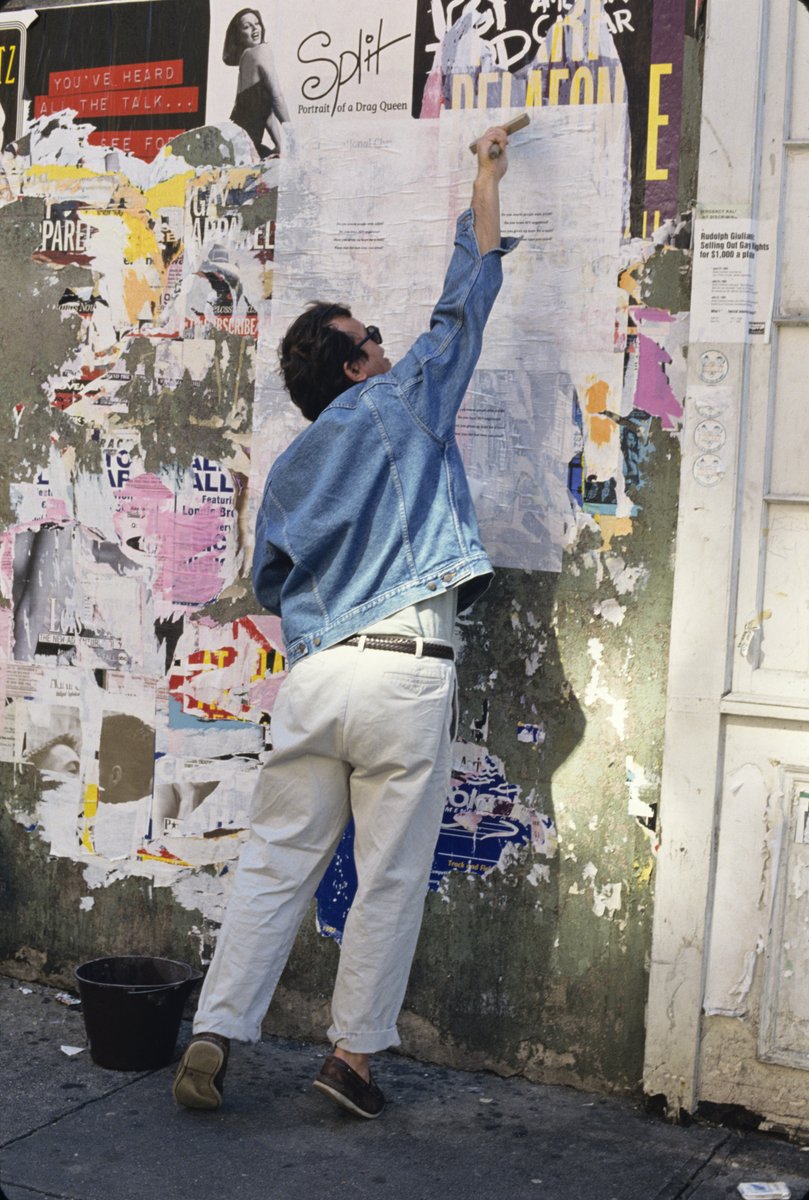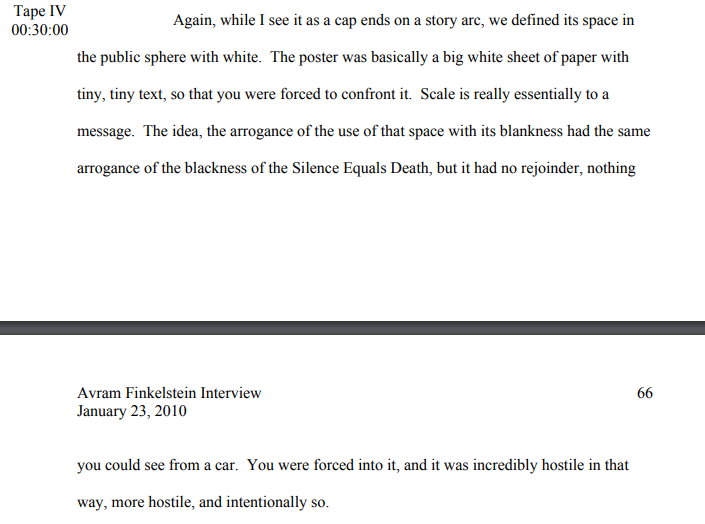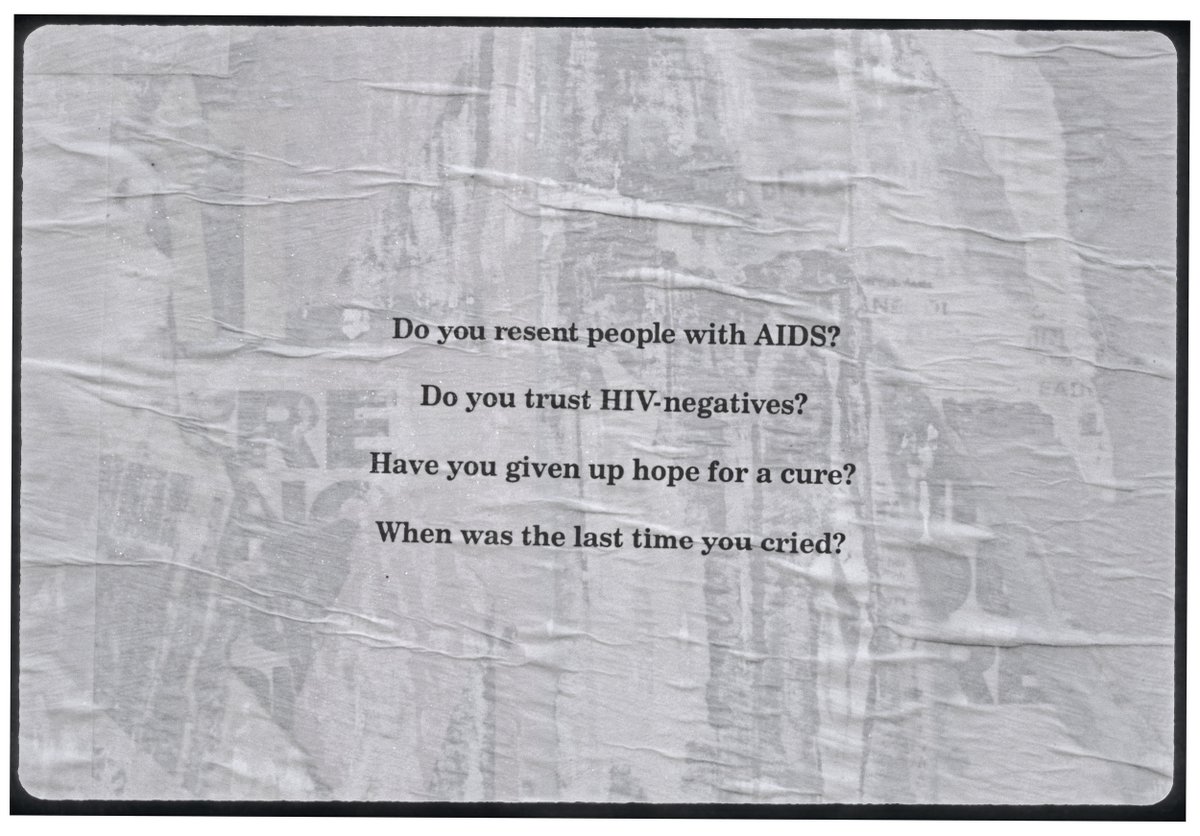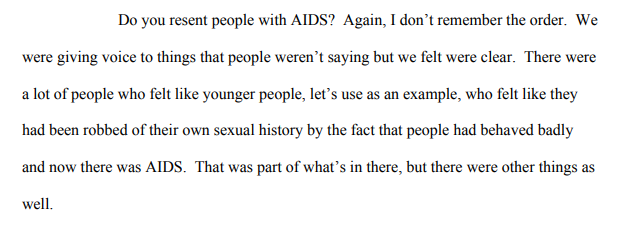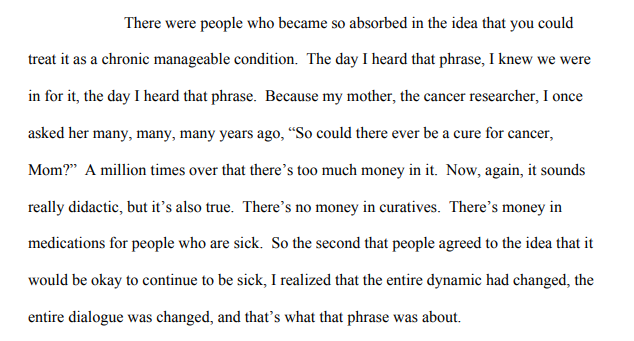This experimental thread discusses the connections between the poster The Four Questions, by ACT UP group Gran Fury, & the four questions, or מה נשתנה, Ma Nishtana, of the Passover seder.
This came from researching the ACT UP Oral History Project, Passover, and people with AIDS.
This came from researching the ACT UP Oral History Project, Passover, and people with AIDS.
ACT UP, the AIDS Coalition to Unleash Power, is one of the greatest activist organizations to begin in the 20th century.
The group has worked for over 30 years to end the AIDS pandemic.
This fight is not over, by any means.
https://actupny.com/ ">https://actupny.com/">...
The group has worked for over 30 years to end the AIDS pandemic.
This fight is not over, by any means.
https://actupny.com/ ">https://actupny.com/">...
The ACT UP Oral History Project is an ongoing project coordinated by Jim Hubbard and Sarah Schulman.
The project has nearly 200 interviews with surviving members of ACT UP.
It& #39;s an incredible historical, community, and LGBTQ resource.
http://www.actuporalhistory.org/ ">https://www.actuporalhistory.org/">...
The project has nearly 200 interviews with surviving members of ACT UP.
It& #39;s an incredible historical, community, and LGBTQ resource.
http://www.actuporalhistory.org/ ">https://www.actuporalhistory.org/">...
ACT UP had a number of affinity groups -- which can be thought of as action groups.
Gran Fury was an ACT UP affinity group that did art and messaging -- mainly appropriating mainstream marketing media to question public assumptions about people with AIDS. https://www.granfury.org/ ">https://www.granfury.org/">...
Gran Fury was an ACT UP affinity group that did art and messaging -- mainly appropriating mainstream marketing media to question public assumptions about people with AIDS. https://www.granfury.org/ ">https://www.granfury.org/">...
Much of Gran Fury& #39;s art and messaging was incredible.
There have been a few exhibitions recently including Gran Fury& #39;s work, including a 2012 NYC retrospective & a 2018 follow up on that retrospective, which took place at Auto Italia South East in London.
http://autoitaliasoutheast.org/project/gran-fury-read-my-lips/">https://autoitaliasoutheast.org/project/g...
There have been a few exhibitions recently including Gran Fury& #39;s work, including a 2012 NYC retrospective & a 2018 follow up on that retrospective, which took place at Auto Italia South East in London.
http://autoitaliasoutheast.org/project/gran-fury-read-my-lips/">https://autoitaliasoutheast.org/project/g...
Passover is the eight-day holiday commemorating the escape of the Jews from slavery under the Egyptians.
During the Passover seder, four questions, the מה נשתנה or Ma Nishtana, ask what rituals make this holiday sacred, unlike other communal meals. https://reformjudaism.org/jewish-holidays/passover/four-questions">https://reformjudaism.org/jewish-ho...
During the Passover seder, four questions, the מה נשתנה or Ma Nishtana, ask what rituals make this holiday sacred, unlike other communal meals. https://reformjudaism.org/jewish-holidays/passover/four-questions">https://reformjudaism.org/jewish-ho...
The four questions of the Passover seder are usually read -- or sung! -- by the youngest person at the seder, or the person most newly experienced with the Jewish teachings.
Here is the Reform Judaism website& #39;s version of the Ma Nishtana song.
http://www.reformjudaism.org/sites/default/files/4questions.mp3">https://www.reformjudaism.org/sites/def...
Here is the Reform Judaism website& #39;s version of the Ma Nishtana song.
http://www.reformjudaism.org/sites/default/files/4questions.mp3">https://www.reformjudaism.org/sites/def...
One really fun version of the Ma Nishtana song is done by the Maccabeats.
This version is vintage YouTube, in a lot of ways, and will pretty much fill you with rhythm and happiness. https://youtu.be/RmabziV1LiY ">https://youtu.be/RmabziV1L...
This version is vintage YouTube, in a lot of ways, and will pretty much fill you with rhythm and happiness. https://youtu.be/RmabziV1LiY ">https://youtu.be/RmabziV1L...
The Ma Nishtana of the Passover seder starts with a sort of preface question asking -- what makes the Passover ritual different?
This is the question that sets the four questions apart as a holy ritual.
This is the question that sets the four questions apart as a holy ritual.
The Ma Nishtana of the Passover seder then address four rituals of the celebration: eating matzah, eating bitter herbs, dipping twice, and reclining while eating.
The questions are answered by the Passover story, commemorating tears & bitterness, but also sweetness & redemption.
The questions are answered by the Passover story, commemorating tears & bitterness, but also sweetness & redemption.
The Gran Fury work The Four Questions was inspired by the Ma Nishtana of the Passover seder.
The work asks its community of readers -- whoever they are! -- to reflect on the tears, bitterness, struggles, and uncertainties of people who live with AIDS. https://www.granfury.org/four-questions ">https://www.granfury.org/four-ques...
The work asks its community of readers -- whoever they are! -- to reflect on the tears, bitterness, struggles, and uncertainties of people who live with AIDS. https://www.granfury.org/four-questions ">https://www.granfury.org/four-ques...
I learned of the connection between the Gran Fury work The Four Questions and the Ma Nishtana of the Passover seder from the ACT UP Oral History interview Sarah Schulman did with Avram Finkelstein.
Here is the interview.
http://www.actuporalhistory.org/interviews/images/finkelstein.pdf">https://www.actuporalhistory.org/interview...
Here is the interview.
http://www.actuporalhistory.org/interviews/images/finkelstein.pdf">https://www.actuporalhistory.org/interview...
Another great interview including Avram Finkelstein and discussing the work of Gran Fury, including The Four Questions, is this one Douglas Crimp did for Artforum.
This interview really discusses the unique emotional nature of The Four Questions. https://www.artforum.com/print/200304/gran-fury-4466">https://www.artforum.com/print/200...
This interview really discusses the unique emotional nature of The Four Questions. https://www.artforum.com/print/200304/gran-fury-4466">https://www.artforum.com/print/200...
In the ACT UP Oral History interview, Avram Finkelstein discusses how Debra Levine highlighted the connections between Gran Fury& #39;s work The Four Questions and the Ma Nishtana of the Passover seder in an amazing essay she wrote on ACT UP -- which is here.
https://pqdtopen.proquest.com/doc/1038821439.html?FMT=AI">https://pqdtopen.proquest.com/doc/10388...
https://pqdtopen.proquest.com/doc/1038821439.html?FMT=AI">https://pqdtopen.proquest.com/doc/10388...
As Debra Levine& #39;s essay discusses, ACT UP members used Judaism as a way to create a sense of solidarity within otherness, while not appropriating the otherness of, say poor people or people of color.
The Passover ritual became a part of ACT UP& #39;s identification with Judaism.
The Passover ritual became a part of ACT UP& #39;s identification with Judaism.
I was actually quite interested to see in Debra Levine& #39;s essay on ACT UP that Avram Finkelstein& #39;s first ACT UP Passover seder was organized by Maria Maggenti!!!
Maggenti is a goddess of mine -- as she directed The Incredibly True Adventure of Two Girls in Love.
Wow!!!
Maggenti is a goddess of mine -- as she directed The Incredibly True Adventure of Two Girls in Love.
Wow!!!
As Debra Levine& #39;s ACT UP essay shows, ACT UP members used Judaism to provide a sense of mutual caring within a community, but also to provide confidence to *question* things.
Rituals like Passover seder also enabled members to reiterate and affirm their struggles as a community.
Rituals like Passover seder also enabled members to reiterate and affirm their struggles as a community.
As Avram Finkelstein& #39;s ACT UP Oral History interview shows, Gran Fury& #39;s work The Four Questions came not only after Gran Fury had technically ended, but as ACT UP itself was in a transitional period.
The Four Questions were like a counterpoint to the iconic Silence = Death.
The Four Questions were like a counterpoint to the iconic Silence = Death.
As Avram Finkelstein says in his ACT UP Oral History interview, Gran Fury& #39;s work The Four Questions also appealed more to the emotional struggles of people with AIDS -- unlike previous ACT UP works.
This came from end-of-life questions of people like Gran Fury& #39;s Mark Simpson.
This came from end-of-life questions of people like Gran Fury& #39;s Mark Simpson.
The מה נשתנה or Ma Nishtana of the Passover seder evoke sacredness, focus, and commemoration.
As Avram Finkelstein says in his ACT UP Oral History interview, Gran Fury& #39;s work The Four Questions, taking up space, yet requiring intimate confrontation, did something similar.
As Avram Finkelstein says in his ACT UP Oral History interview, Gran Fury& #39;s work The Four Questions, taking up space, yet requiring intimate confrontation, did something similar.
The first question Gran Fury& #39;s work asks is, Do you resent people with AIDS?
This question is for younger people in the LGBTQ community who, as Avram Finkelstein says in his ACT UP Oral History interview, may feel older gay people, having acted recklessly, ruined sex for them.
This question is for younger people in the LGBTQ community who, as Avram Finkelstein says in his ACT UP Oral History interview, may feel older gay people, having acted recklessly, ruined sex for them.
The second of Gran Fury& #39;s Four Questions asks, Do you trust HIV-negatives?
This question was for HIV-positive people who felt like HIV-negative people in the ACT UP community acted with ulterior motives or emotions, or simply weren& #39;t able to care adequately for the HIV-positive.
This question was for HIV-positive people who felt like HIV-negative people in the ACT UP community acted with ulterior motives or emotions, or simply weren& #39;t able to care adequately for the HIV-positive.
The third of Gran Fury& #39;s Four Questions, Have you given up hope for a cure?, got the most conversation in Avram Finkelstein& #39;s ACT UP Oral History interview.
Capitalism, Finkelstein says, leads to chronic manageable conditions: not cured diseases.
Painfully proven time & again.
Capitalism, Finkelstein says, leads to chronic manageable conditions: not cured diseases.
Painfully proven time & again.
Strangely, the fourth of Gran Fury& #39;s Four Questions -- that most fitting of the מה נשתנה themes of tears & bitterness -- When was the last time you cried? -- got no conversation at all in Avram Finkelstein& #39;s ACT UP Oral History interview.
Such a weighty absence, in my opinion.
Such a weighty absence, in my opinion.
This thread has presented only a small piece of the story of what Judaism, Passover, and the מה נשתנה meant in the lives of members of the ACT UP community.
I wanted to write this experimental thread, hopefully to encourage other people to think about this intersectionality.
I wanted to write this experimental thread, hopefully to encourage other people to think about this intersectionality.

 Read on Twitter
Read on Twitter